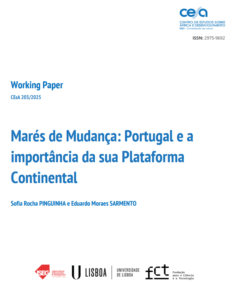CEsA Working Paper analyses the challenges and opportunities of the expansion of the Portuguese continental shelf in the context of a sustainable blue economy

The article seeks to understand the extent to which the extension of the Portuguese continental shelf aligns with the country’s strategic and economic objectives, with particular emphasis on aspects related to the harnessing of its strategic potential
Throughout history, Portugal’s development and affirmation as a country have been closely tied to maritime exploration and dominance. Aware of the economic potential of ocean floors and marine biodiversity, and seeking to strengthen its sovereignty and international recognition, Portugal submitted a proposal on 11 May 2009 to the Commission on the Limits of the Continental Shelf (CLCS) to extend its continental shelf beyond the 200 nautical miles. However, the success of this proposal — which intertwines geopolitical, economic, and environmental dimensions — will depend on the country’s ability to balance strategic interests with environmental sustainability, particularly in the context of the blue economy.
CEsA Working Paper No. 203/2025, entitled Marés de Mudança: Portugal e a importância da sua Plataforma Continental (Tides of Change: Portugal and the Importance of Its Continental Shelf), aims to analyse the strategic potential of the continental shelf through two guiding questions: What motivations are driving Portugal’s proposal to expand its continental shelf? And what strategies should be adopted to harness the strategic potential of the Portuguese sea? The publication is authored by Sofia Rocha Pinguinha, who holds a master’s degree in Development and International Cooperation (ISEG – Universidade de Lisboa), and Eduardo Moraes Sarmento, PhD in Economics with a specialisation in Tourism and Professor at ISEG.
Working Paper No. 203/2025 can be downloaded from the CEsA collection, available through the Universidade de Lisboa Repository:
https://repositorio.ulisboa.pt/bitstream/10400.5/100623/1/Pinguinha%20Sofia%20e%20Eduardo%20Sarmento%20WP%20203-2025.pdf
Abstract:
 Portugal, known for its historic maritime traditions, is currently immersed in a strategic ambition regarding the expansion of its continental shelf driven by geopolitical, economic and environmental factors, placing the country before a dynamic maritime scenario full of challenges and opportunities. The rise of the blue economy, synonymous with a sustainable economy, redefines the indispensability of the ocean and its centrality in the balance of building the sustainable development that is sought globally (Cristas, 2022). Using a qualitative methodology, the aim is to reflect on the main benefits that Portugal can obtain from the possible approval of the expansion of its continental shelf, by the United Nations Organisation (UNO). The future, according to the National Strategy for the Sea 2021-2030 (República Portuguesa, 2021), should involve defining a strategy, based on a system of alliances, that will allow Portugal to move forward with the sustainable exploitation of the marine resources (Seguro, 2022).
Portugal, known for its historic maritime traditions, is currently immersed in a strategic ambition regarding the expansion of its continental shelf driven by geopolitical, economic and environmental factors, placing the country before a dynamic maritime scenario full of challenges and opportunities. The rise of the blue economy, synonymous with a sustainable economy, redefines the indispensability of the ocean and its centrality in the balance of building the sustainable development that is sought globally (Cristas, 2022). Using a qualitative methodology, the aim is to reflect on the main benefits that Portugal can obtain from the possible approval of the expansion of its continental shelf, by the United Nations Organisation (UNO). The future, according to the National Strategy for the Sea 2021-2030 (República Portuguesa, 2021), should involve defining a strategy, based on a system of alliances, that will allow Portugal to move forward with the sustainable exploitation of the marine resources (Seguro, 2022).
About the authors:
Sofia Rocha Pinguinha holds a Master’s degree in Development and International Cooperation (ISEG – Universidade de Lisboa).
Eduardo Moraes Sarmento holds a PhD in Economics with a specialization in Tourism. He is the coordinator of the Master’s in Development and International Cooperation at ISEG (University of Lisbon), a researcher, president of CEsA, and a member of the Scientific Committee of ISEG Research.
Click here to explore the full collection of CEsA Working Papers
Author: CEsA Communication Team (comunicacao@cesa.iseg.ulisboa.pt)
Image: Reproduction





